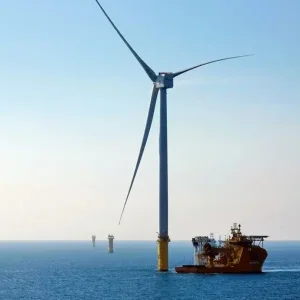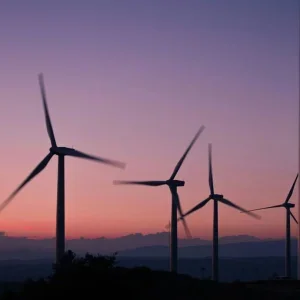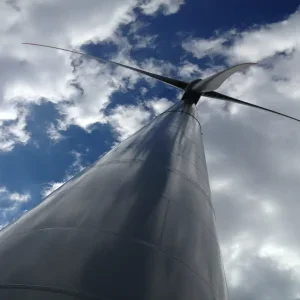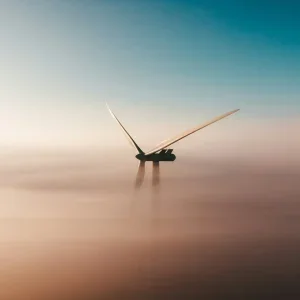It’s not easy to make waves in the wind energy industry, given that there are many established players with a track record of success in the manufacture of key components, but the opening of a new state-of-the-art plant in Bilbao for wind turbine tower construction has ensured that Haizea Wind Group is sending ripples through the market.
Officially opened in May, the €60-million plant is vast. It occupies 77,000m2 of space on the AZ-2 quay in the port of Bilbao, with direct access to the berthing quay, which has wide draughts ensuring efficient logistics for the components coming out of the facility, which itself measures 500m in length. The plant has three bays, each with a width of 35m, and features the latest in highly specialised machinery to enable the production of large towers, monopoles and transition pieces with short lead times.
Initially, production capacity will be 100 monopiles a year that are 100m in length and up to 10.5m in diameter. Ultimately, it will be able to produce 300 sections of offshore towers a year that are 50m in length and up to 8.6m in diameter, as well as 100,000t of offshore foundations. The factory has already completed its first assignment, the production of turbine towers for Vestas, and is now working on orders_from Siemens Gamesa and GE.
The company was created with the clear aim of becoming the next global supplier to the industry, and the plant in Bilbao, which stands apart from many of its competitors by producing components for onshore and offshore wind turbines, is a big step forward in achieving this goal. Staking a claim as a key provider to the industry, however, requires an intense focus on quality control.
“The size of the plant is one challenge, but a bigger challenge was the fact that we started manufacturing in May and had to build everything in the quality programme from scratch,” says Borja Muga, Haizea Wind Group’s quality manager for the Bilbao plant. “We had to get the inspectors on the lines, and we had to do many other things in a short period of time. Fortunately, we are working closely with our customers, who have spared a lot of time for us to help get everything right.”
Leading a team of six (including four inspectors, who spend the majority of their time in the workshop, and two quality engineers, who act as the team’s main point of contact for Haizea’s key customers), Muga’s key goal is to maintain the highest manufacturing standards across a large and complex facility, and, so far, he has been highly successful in achieving this.
“Since opening, the trial results have been good and rejection rates have been low. The rate is less than 1% for welding, even though we are only a young company, because we hired experienced welders. We are trying to develop something here that means quality management is not only the job of my team, but it is also the job of the production team and of management,” he remarks.
“We have developed quality thinking within our internal customer, which is the workshop, and instilled a culture of quality throughout the plant. Every person here knows what the final result of our efforts should be.”
Certified success
A new company cannot call on its past successes to build confidence among its customers, so Muga’s most important mission was to secure the certification for its production processes as quickly as possible.
“The reason that we had to get certifications fast is that we are a young company, so the main worry that our customers have is that we are too new to the industry, which leads to doubts about our capability,” says Muga. “So we need to demonstrate the level of quality that we have within the organisation. We can’t talk to customers about the data from our operations, as we have no track record of references, so we need the certifications to show the quality of our manufacturing processes and our management.”
In the two months following the inauguration of its Bilbao plant, Haizea secured five Lloyd’s ISO, EN and OSHAS certificates.
The ISO 9001: 2015 standard validates that the company meets the needs of customers and other stakeholders, while meeting statutory and regulatory requirements related to its products. It focuses on quality management standards and performance, paying particular attention to the appropriateness of the implementation of a management system that meets the specific needs of the organisation. ISO 14001 sets a standard for environmental management and recognises that an organisation has minimised the negative impact of its operations on the environment, complies with applicable laws and regulations, and has put in place a programme to continually improve its environmental performance.
With safety such a high priority in the industry, Muga also set his sights on the OHSAS 18001 at an early stage. The standard ensures that an organisation has attained a high level of occupational health and safety, having identified key risks and taken appropriate measures to reduce accidents. ISO3834-2 relates specifically to the fusion welding of metallic materials. Finally, EN 1090 is a European standard that regulates the fabrication and assembly of steel and aluminium structures.
“EN 1090 was the most complicated, but we are now certified to Execution Class 4, which is one of the highest standards of quality in Europe. Getting all of those certifications was not easy in such a short period of time, but we rely on four key aspects to build our progress,” notes Muga. “First, we collaborate closely with our technology partner, Tecnoaranda, taking their experience to help build our own systems. Secondly, we hired people from other tower manufacturers, so there was a lot of experience in the team from the beginning.
“Third, we worked closely with our first customer, Vestas, and that strategy has been a key factor in our success as we start to work with other customers such as GE and Siemens. Finally, the most important factor: our people. Everything started from nothing, and we built production lines, the management systems and the culture of the organisation, which meant there were many challenges and was a lot of pressure along the way, but we made sure we had the right people who could fix all of the problems as they arose,” he adds.
Nascent and enthusiastic
The rapid process of certification has helped to build the company’s reputation for quality, and the response from its key customers has already been enthusiastic.
“The certifications are essential,” says Muga. “Some are mandatory in the market, and all of our competitors have them, but it was especially important for us. We started to manufacture in April, with our first products released in August, so we had to show our customers that we had got up to the right standard fast.
“I only joined the company in December 2017, and my first job was to certify the plant. We had to do a twoyear job in six months, so we had to design a simple process, of which an important part was the collaboration with Tecnoaranda. We were able to adapt its documentation to our needs. Then we defined a strong plan to achieve ISO 3834 and EN 1090 from the start, which meant dedicating the right resources to the many actions required,” Muga explains.
The input of Vestas was crucial in getting the Bilbao plant up to the highest standard as quickly as possible, and remains a vital element of Haizea’s strategy going forward.
“During the ramp-up phase, we took customer qualification with Vestas to raise any potential issues early, and we were fortunate that Vestas devoted a lot of time to processes like welding and surface treatments; it’s a great relationship on which we can build. Then, we had to develop the most difficult thing of all – a continuous improvement mindset, which is part of the whole culture of the factory, not just my team.”
Constant refinement
The further development of this culture of quality rests on Haizea’s detailed focus on critical processes, its implementation of strong controls and follow-up procedures, and its ability to gather and analyse data in support of continuous improvement.
“In the future, we will focus more on data analysis, as well as data collection,” says Muga. “We need to get the data on our critical processes faster and do more in-depth data analysis. That will help us with the next challenge, which is to qualify with all of our customers – we have 75% qualification from Vestas already – and get the green light from them, which will allow us to be a key player in the market.
“When all of our processes are fully integrated, we aim to manufacture faster, but speed and quality must go together. Faster production cannot mean a reduction in quality. What we are selling is confidence. Our customers must have confidence in our processes, so they look carefully at our quality management and our people when they do their validation process and perform their tests during the manufacturing stage.”
The Bilbao factory is Haizea’s second start-up, following the opening of a wind tower plant in Argentina in a joint venture with a local manufacturer, and the next step in its globalisation strategy will be a further joint venture in Saudi Arabia with local company Al-Babtain. Nevertheless, Bilbao is a key pillar of the company’s growth strategy and, having reached such high standards so quickly, there is no doubt that the company’s commitment to quality and continuous improvement will rapidly build its standing among some of the world’s biggest players in the wind energy industry.






